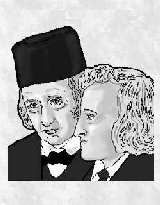
Born: January 4, 1785 and February 24, 1786, in Hanau, Germany
Died: September 20, 1863 and December 16, 1859, in Berlin, Germany
The Brothers Grimm collaborated to create one of the most popular collections of folk tales worldwide, Kinder-und Hausmärchen, or Grimm's Fairy Tales. These were popular with both adults and children of the middle and lower- class. Today, the tales continue to influence folklore narrative and have been translated into over seventy languages. They stand out from other writings of the time for their portrayal of realism as opposed to fantasy.
Jacob was the oldest child in a family of five brothers and one sister. Their father, Philipp Wilhelm, was a lawyer and the town clerk of Hanau. Philipp's father and grandfather were both ministers of the Calvinistic Reformed Church. The death of both parents left Jacob to care for the family at the age of twenty-three.
The Brothers Grimm went to high school in Kassel and then, like their father, went on to study law at the University of Marburg from 1802 to 1806. At university, the brothers developed an interest in folk poetry through their relationship with the poets Clemens Brentano, Friedrich Karl von Savingy, and Johann Gottfired Herder.
The Brothers Grimm first collected folk tales and songs for Clemens Brentano's influential collection of folk songs. The Brothers Grimm set out to publish their own collection, which has become known as Grimm's Fairy Tales.
The Brothers Grimm began to work independently in their study of literature and folklore. Wilhelm edited medieval texts of German legends while Jacob established a scientific method of studying folklore and the German language. Jacob's works include Deutsche Mythologie, which was written in 1835, and Deutsche Grammatik, which was written from 1819 to 1837.
In 1829, both brothers took positions at the University of Gottingen as librarians and professors. However, when the king repealed the constitution of 1833 on the basis that it was too liberal, the brothers protested as part of the Gottingen Seven. All seven members were let go from the university. Jacob and two other members were exiled from the kingdom of Hanover.
In 1840, Frederick William IV, king of Prussia, invited the Brothers Grimm to Berlin to lecture at the university. The brothers remained members of the Royal Academy of Sciences for the next twenty years. They continued their work on the Deutsches Wörterbuch, a respected linguistic study of the German language, which they had begun for financial reasons after their dismissal from the University of Gottingen. The brothers never saw the work completed. Wilhelm died when the work was completed only to the letter "D" and Jacob at the letter "F". The work, which was continued by a succession of scholars, wasn't completed until 1960.